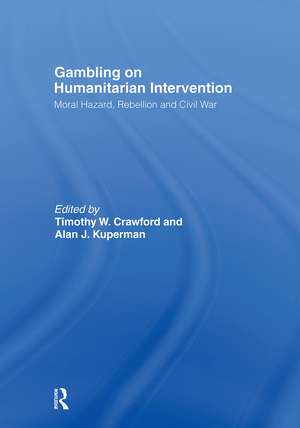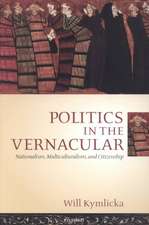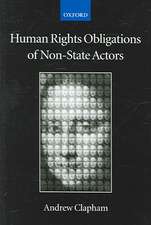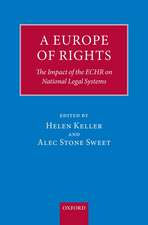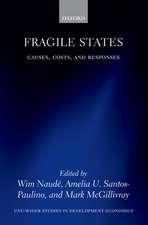Gambling on Humanitarian Intervention: Association for the Study of Nationalities
Editat de Alan Kuperman, Timothy Crawforden Limba Engleză Paperback – 24 dec 2007
Such questions lie at the heart of a new and lively controversy in international politics. "Gambling on Humanitarian Intervention" explores whether the emerging norm of intervention backfires in conflicts such as Kosovo, exacerbating the ethnic cleansing and killing of innocent civilians. Leading academics investigate this problem, including when and where it is most likely to occur, and how to avert the unintended consequences without abandoning intervention. Sceptics weigh in as well, pointing out potential errors in blaming intervention for civil violence, and offering alternative explanations. Several authors conclude with prescriptions to ensure that future interventions mitigate violence, as intended, rather than tragically worsening it.
This book was previously published as a special issue of "Ethnopolitics".
| Toate formatele și edițiile | Preț | Express |
|---|---|---|
| Paperback (1) | 319.70 lei 6-8 săpt. | |
| Taylor & Francis – 24 dec 2007 | 319.70 lei 6-8 săpt. | |
| Hardback (1) | 666.67 lei 6-8 săpt. | |
| Taylor & Francis – 25 mai 2006 | 666.67 lei 6-8 săpt. |
Din seria Association for the Study of Nationalities
- 17%
 Preț: 184.81 lei
Preț: 184.81 lei - 12%
 Preț: 299.52 lei
Preț: 299.52 lei - 17%
 Preț: 184.81 lei
Preț: 184.81 lei - 17%
 Preț: 184.81 lei
Preț: 184.81 lei - 17%
 Preț: 184.81 lei
Preț: 184.81 lei - 12%
 Preț: 299.52 lei
Preț: 299.52 lei - 17%
 Preț: 183.96 lei
Preț: 183.96 lei - 17%
 Preț: 295.74 lei
Preț: 295.74 lei - 26%
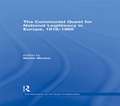 Preț: 820.73 lei
Preț: 820.73 lei - 17%
 Preț: 255.86 lei
Preț: 255.86 lei - 18%
 Preț: 187.49 lei
Preț: 187.49 lei -
 Preț: 407.01 lei
Preț: 407.01 lei - 17%
 Preț: 190.88 lei
Preț: 190.88 lei - 25%
 Preț: 496.53 lei
Preț: 496.53 lei - 25%
 Preț: 523.55 lei
Preț: 523.55 lei - 15%
 Preț: 297.62 lei
Preț: 297.62 lei - 16%
 Preț: 312.43 lei
Preț: 312.43 lei - 17%
 Preț: 257.94 lei
Preț: 257.94 lei - 13%
 Preț: 294.43 lei
Preț: 294.43 lei - 17%
 Preț: 267.77 lei
Preț: 267.77 lei - 17%
 Preț: 268.59 lei
Preț: 268.59 lei
Preț: 319.70 lei
Nou
Puncte Express: 480
Preț estimativ în valută:
61.18€ • 64.33$ • 50.55£
61.18€ • 64.33$ • 50.55£
Carte tipărită la comandă
Livrare economică 16-30 aprilie
Preluare comenzi: 021 569.72.76
Specificații
ISBN-13: 9780415463744
ISBN-10: 0415463742
Pagini: 116
Dimensiuni: 178 x 254 x 6 mm
Greutate: 0.21 kg
Ediția:1
Editura: Taylor & Francis
Colecția Routledge
Seria Association for the Study of Nationalities
Locul publicării:Oxford, United Kingdom
ISBN-10: 0415463742
Pagini: 116
Dimensiuni: 178 x 254 x 6 mm
Greutate: 0.21 kg
Ediția:1
Editura: Taylor & Francis
Colecția Routledge
Seria Association for the Study of Nationalities
Locul publicării:Oxford, United Kingdom
Recenzii
"The studies in this volume help us understand the dynamic background of domestic wars, wars of secession, politicides, and genocides. They serve as a useful corrective to media treatments of these issues, treatments that are often oversimplified in their haste to classify perpetrators and victims. The arguments in the seven essays of the volume are compelling, often relying on close examination of assumptions and the empirical evidence. A scientific enterprise, depending upon carefully marshalled evidence and rigorous logical analysis, helps to move us away from the rather mushy literature tha has been the hallmark of the humanitatian intervention discourse to date...The authors of this volume have made a major contribution in showing the way forward to a more reliable understanding of rebellions, wars, politicides, and genocides."
-Kalevi J. Holsti, Journal of Genocide Research
-Kalevi J. Holsti, Journal of Genocide Research
Cuprins
Introduction, Timothy W. Crawford, Alan J. Kuperman; Chapter 1 Suicidal Rebellions and the Moral Hazard of Humanitarian Intervention, Alan J. Kuperman; Chapter 2 Moral Hazard, Intervention and Internal War, Timothy W. Crawford; Chapter 3 Third-party Intervention and Escalation in Kosovo, Arman Grigorian; Chapter 4 Conflict Management and the Misapplication of Moral Hazard Theory, Robert W. Rauchhaus; Chapter 5 Illusions of Moral Hazard, Jon Western; Chapter 6 The Hazards of Thinking about Moral Hazard, R. Harrison Wagner;
Notă biografică
Timothy W. Crawford is assistant professor of political science at Boston College. He has held fellowships at the Brookings Institution, Princeton’s Center of International Studies, and Harvard’s Center for International Affairs. He is a term-member of the Council on Foreign Relations, a faculty associate of the Olin Institute of Strategic Studies, and a member of the board of directors of America Abroad Media.,
Alan J. Kuperman is assistant professor at the LBJ School of Public Affairs, University of Texas at Austin. He was formerly resident assistant professor of international relations, and director of the international relations program, at Johns Hopkins University’s School of Advanced International Studies (SAIS) in Bologna, Italy. He has received fellowships from Harvard University, MIT, the University of Southern California, the U.S. Institute of Peace, the Brookings Institution, and the Institute for the Study of World Politics.
Alan J. Kuperman is assistant professor at the LBJ School of Public Affairs, University of Texas at Austin. He was formerly resident assistant professor of international relations, and director of the international relations program, at Johns Hopkins University’s School of Advanced International Studies (SAIS) in Bologna, Italy. He has received fellowships from Harvard University, MIT, the University of Southern California, the U.S. Institute of Peace, the Brookings Institution, and the Institute for the Study of World Politics.
Descriere
This volume explores whether the emerging norm of intervention has backfired by exacerbating violence in conflicts such as Kosovo, leading to the unnecessary deaths and ethnic cleansing of innocent civilians.
